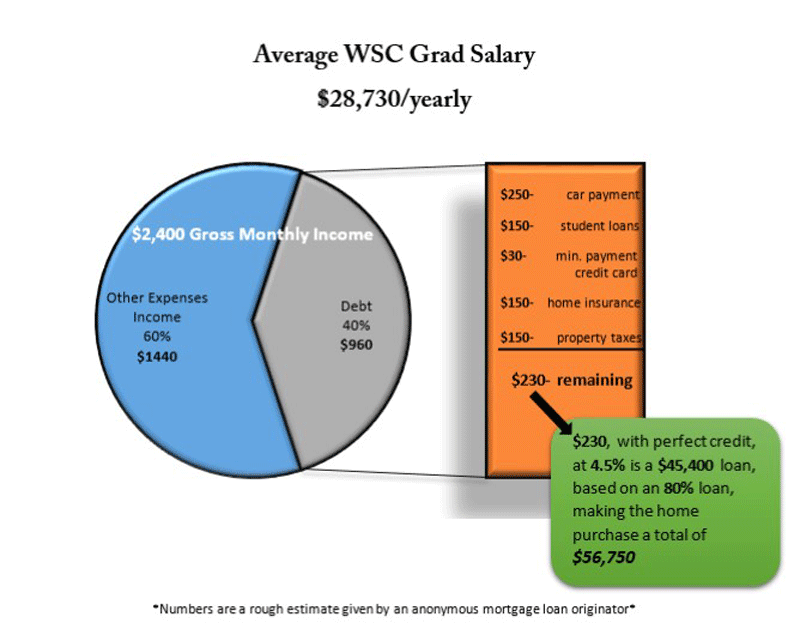Buying and selling Wayne
There’s disconnect between wages and starter homes
April 23, 2014
On the City of Wayne’s website, Mayor Ken Chamberlain’s welcome is displayed. He writes about how Wayne marches forward with “vigorous development and an innovative attitude” and how the “friendly people, sound economy and comfortable lifestyle make Wayne a great place to live and work.”
He’s selling Wayne to everyone he can. As the mayor, it’s his job to make Wayne attractive to anyone who steps into city limits.
On Wayne State’s website there is a page of fast facts, one of them being that in the academic year 2013-14, enrollment was 3,513 students. Of those students, there are 38 states and 21 different countries represented.
And some of those college kids feel a connection to Wayne. They believe in what Mayor Chamberlain and so many other residents believe—that Wayne is a great place to live. So they stay. They find jobs and settle into the community.
According to a study done by Wayne State College, published on its website, graduates in 2010/11 out of all the schools averaged a salary of $28,730.81.Inflation jumped a bit in 2012 but dropped back down in 2013 and has held pretty steady since, so that number should still be fairly accurate.
Broken down, that salary is roughly $2,400 per month. Seems like a considerable amount, but add in expenses such as a phone bill, car payment and groceries and that salary decreases considerably. This isn’t accounting for new graduates paying out of pocket for their health insurance or if that new graduate has a family of their own.
When a person takes all those factors into consideration, that $2,400 seems to dwindle out of sight quickly.
“Average scenario, just out of school, generally means a car payment and student loans,” a mortgage loan originator who wishes to remain anonymous said. “Most people only have a couple hundred dollars left over and we base our loans off of the amount they have left over.”
For a typical loan, a person is allowed to take no more than 40 percent out of their gross monthly income for debt payments. These include car payments and credit card payments as well as student loans and, in the event they are buying a home, it must also include property taxes and insurance as well as their house payment.
“If their 40 percent is $250, we wouldn’t even be able to get them a full $50,000 loan,” he said, “and that’s assuming they have a credit score of 720 or more and 20 percent down. Altogether, that would buy them a $60,000 home.”
To buy a home on one salary is difficult in any town, but the lack of affordable housing in Wayne
makes that more difficult. There is a great deal of homes listed for sale in the $101,000 to $150,000 range. There are homes priced lower and some priced much higher than those, but the largest concentration is in the $100,000 plus price range.
The quality of home drastically decreases as the price decreases, which makes for some great fixer-uppers, but for many the cost of repairs is too much, not to mention the time needed to make those repairs.
Trisha Peters of 1st Realty Sales and Management in Wayne breaks down how they define a starter home.
“The price for a typical ‘starter’ home ranges from $75,000 to $125,000,” Peters said. “Such homes usually include 2-3 bedrooms, 1-2 baths, 1,000-1,200 square feet and a basement. Depending on the price, a one or two car garage might also be included.”
And while $75,000 seems realistic for those just out of college interested in buying a home, $125,000 would be out of many people’s price range on a single income.
Wayne offers a first time home buying program through the Wayne Community Housing Development Corporation. Many stipulations surround the program, one of the main ones being that the home must not cost more than $120,000. Another large part of the program is that there must be work that needs to be done to the home being purchased.
Basically, a person could not even use the program on one of the many homes for sale due to price or the fact that it is a new build, needing no rehabilitation.
There is no denying that there is housing available in Wayne, but residents shouldn’t be surprised when they aren’t able to retain new grads and newly-built homes sit empty. The lack of quality, affordable homes for new graduates will prevent growth in Wayne. Growth Wayne wants to see.







